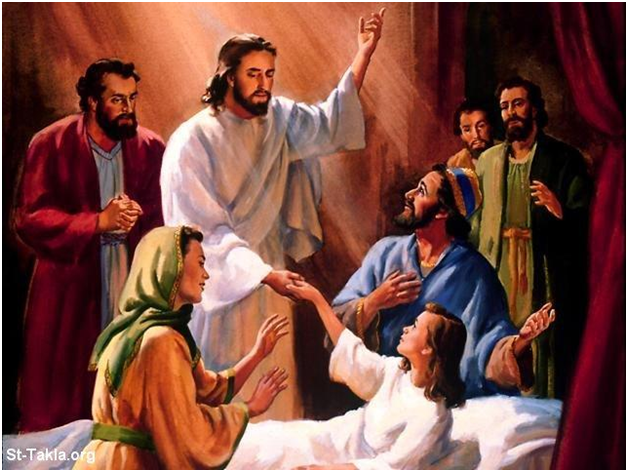 Sunday June 28 2015 is The Thirteenth Sunday in Ordinary Time Year B
Sunday June 28 2015 is The Thirteenth Sunday in Ordinary Time Year B
SUNDAY SUNDAY SUNDAY PODCAST – LIFETEEN
Reflections – Christ in Our Neighborhood guide materials – Father Dolan, Diocese of San Diego
Sunday Connection – www.loyolapress.com
While he was still speaking, there came from the ruler’s house some who said, “Your daughter is dead. Why trouble the Teacher any further?” But ignoring what they said, Jesus said to the ruler of the synagogue, “Do not fear, only believe.” And he allowed no one to follow him except Peter and James and John the brother of James. When they came to the house of the ruler of the synagogue, he saw a tumult, and people weeping and wailing loudly. And when he had entered, he said to them, “Why do you make a tumult and weep? The child is not dead but sleeping.” And they laughed at him. But he put them all outside, and took the child’s father and mother and those who were with him, and went in where the child was. Taking her by the hand he said to her, “Talitha cumi”; which means, “Little girl, I say to you, arise.” And immediately the girl got up and walked (she was twelve years of age), and they were immediately overcome with amazement. And he strictly charged them that no one should know this, and told them to give her something to eat.” – Homily from Father Daniel Meynen
Coloring Page for the Thirteenth Sunday in Ordinary Time Year B – CatholicMom.com
Crossword Puzzle – CatholicMom.com
The Christian meaning of death – www.doctrinalhomilyoutlines.com
God Did Not Make Death – Father Robert Barron homily
Mother Angelica Live – Death and Dying – 11/2/99
Superman by Five for Fighting video
My Future Decided by Hillsong United video
Mark 5:21-34 Jesus Heals Jairus’ Daughter and the Woman who Touched Jesus’ Cloak video
The Miracle (New Easter song by Shawna Edwards) video
Reflection on this week’s Mass from www.word-sunday.org
June 2015 Sunday Gospel Activities CatholicMom.com Resources
Sunday Mass Readings 6/28/2015 from USCCB
WIS 1:13-15; 2:23-24 – God did not make death
PS 30:2, 4, 5-6, 11, 12, 1 – I will praise you, Lord, for you have rescued me.
2 COR 8:7,9,13-15 – He became poor that through his poverty you might become rich
MK 5:21-43 – A Girl Restored to Life and a Woman Healed
Our Savior Jesus Christ destroyed death and brought life to light through the Gospel.
First Reading: Because God did not make death,
and he does not delight in the death of the living.
For he created all things that they might exist,
and the generative forces of the world are wholesome,
and there is no destructive poison in them;
and the dominion of Hades is not on earth.
For righteousness is immortal.
Second Reading: Now as you excel in everything—in faith, in speech, in knowledge, in utmost eagerness, and in our love for you—so we want you to excel also in this generous undertaking.
For you know the generous act of our Lord Jesus Christ, that though he was rich, yet for your sakes he became poor, so that by his poverty you might become rich.
I do not mean that there should be relief for others and pressure on you, but it is a question of a fair balance between your present abundance and their need, so that their abundance may be for your need, in order that there may be a fair balance. As it is written,
“The one who had much did not have too much,
and the one who had little did not have too little.”
Gospel:When Jesus had crossed again in the boat to the other side, a great crowd gathered around him; and he was by the sea. Then one of the leaders of the synagogue named Jairus came and, when he saw him, fell at his feet and begged him repeatedly, “My little daughter is at the point of death. Come and lay your hands on her, so that she may be made well, and live.” So he went with him. And a large crowd followed him and pressed in on him. Now there was a woman who had been suffering from hemorrhages for twelve years. She had endured much under many physicians, and had spent all that she had; and she was no better, but rather grew worse. She had heard about Jesus, and came up behind him in the crowd and touched his cloak, for she said, “If I but touch his clothes, I will be made well.” Immediately her hemorrhage stopped; and she felt in her body that she was healed of her disease. Immediately aware that power had gone forth from him, Jesus turned about in the crowd and said, “Who touched my clothes?” And his disciples said to him, “You see the crowd pressing in on you; how can you say, ‘Who touched me?’” He looked all around to see who had done it. But the woman, knowing what had happened to her, came in fear and trembling, fell down before him, and told him the whole truth. He said to her, “Daughter, your faith has made you well; go in peace, and be healed of your disease.”
And a large crowd followed him and pressed in on him. Now there was a woman who had been suffering from hemorrhages for twelve years. She had endured much under many physicians, and had spent all that she had; and she was no better, but rather grew worse. She had heard about Jesus, and came up behind him in the crowd and touched his cloak, for she said, “If I but touch his clothes, I will be made well.” Immediately her hemorrhage stopped; and she felt in her body that she was healed of her disease. Immediately aware that power had gone forth from him, Jesus turned about in the crowd and said, “Who touched my clothes?” And his disciples said to him, “You see the crowd pressing in on you; how can you say, ‘Who touched me?’” He looked all around to see who had done it. But the woman, knowing what had happened to her, came in fear and trembling, fell down before him, and told him the whole truth. He said to her, “Daughter, your faith has made you well; go in peace, and be healed of your disease.”
While he was still speaking, some people came from the leader’s house to say, “Your daughter is dead. Why trouble the teacher any further?” But overhearing what they said, Jesus said to the leader of the synagogue, “Do not fear, only believe.” He allowed no one to follow him except Peter, James, and John, the brother of James.  When they came to the house of the leader of the synagogue, he saw a commotion, people weeping and wailing loudly. When he had entered, he said to them, “Why do you make a commotion and weep? The child is not dead but sleeping.” And they laughed at him. Then he put them all outside, and took the child’s father and mother and those who were with him, and went in where the child was. He took her by the hand and said to her, “Talitha cum,” which means, “Little girl, get up!” And immediately the girl got up and began to walk about (she was twelve years of age). At this they were overcome with amazement. He strictly ordered them that no one should know this, and told them to give her something to eat.
When they came to the house of the leader of the synagogue, he saw a commotion, people weeping and wailing loudly. When he had entered, he said to them, “Why do you make a commotion and weep? The child is not dead but sleeping.” And they laughed at him. Then he put them all outside, and took the child’s father and mother and those who were with him, and went in where the child was. He took her by the hand and said to her, “Talitha cum,” which means, “Little girl, get up!” And immediately the girl got up and began to walk about (she was twelve years of age). At this they were overcome with amazement. He strictly ordered them that no one should know this, and told them to give her something to eat.
Scripture quotations are from the New Revised Standard Version Bible: Catholic Edition, copyright © 1989, 1993 the Division of Christian Education of the National Council of the Churches of Christ in the United States of America. Used by permission. All rights reserved.
Listen to the Readings
Pope Francis
APOSTOLIC LETTER OF HIS HOLINESS POPE FRANCIS TO ALL CONSECRATED PEOPLE ON THE OCCASION OF THE YEAR OF CONSECRATED LIFE“In response to requests from many of you and from the Congregation for Institutes of Consecrated Life and for Societies of Apostolic Life, I decided to proclaim a Year of Consecrated Life on the occasion of the fiftieth anniversary of the Dogmatic Constitution on the Church Lumen Gentium -Pope Francis
Arise: Scott Hahn Reflects on the Thirteenth Sunday in Ordinary Time
Mass Preparation for this Sunday




You must be logged in to post a comment.